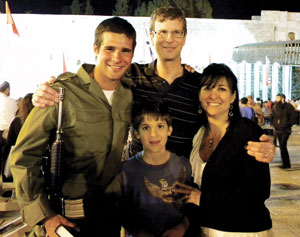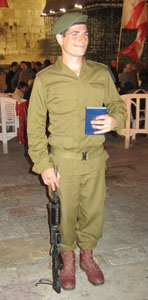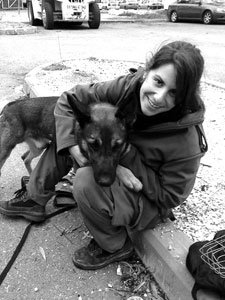Several young men and women from the Kansas City Jewish community serve in the Israel Defense Forces. They are considered Lone soldiers, who are soldiers who have no family in Israel. Here are four of their stories.
Becoming a paratrooper Sam Mendel is a very excited young man. The 21-year-old son of Doris and William Mendel and member of The Temple, Congregation B’nai Jehudah, was recently trained as a member of the special forces paratroopers unit of the Israel Defense Forces.
Sam Mendel is a very excited young man. The 21-year-old son of Doris and William Mendel and member of The Temple, Congregation B’nai Jehudah, was recently trained as a member of the special forces paratroopers unit of the Israel Defense Forces.
Sam graduated from Blue Valley North High School in 2008 and then began his college career at the University of Kansas. He visited Israel for the first time for his brother’s Bar Mitzvah at the Western Wall that same year. He also went on a Birthright Israel trip during the 2009 winter break with his good friend Ethan Bennett. The following year, still having special feelings about Israel, he returned with another good friend, Shaun Roecker, to backpack for two weeks.
During the second semester of his sophomore year at KU he started asking himself, “What am I doing? I don’t know what I want to do with my life. What’s the point of being in school?”
He talked his feelings over with his grandmother, Magda Haber. He says he feels very close to both his parents and his grandparents and during his talk with Haber, she asked him if he’d ever thought of making aliyah.
“I’d kind of thought about it, but it meant leaving everything behind,” Mendel says.
But what Haber said hit a chord with Mendel and he started looking on the Internet for army programs. He found Machal, an army volunteer program.
By October of last year, Mendel had bought a ticket and was on his way to Israel. He got accepted to Machal and was assigned the December draft. At the time he arrived, he said the only Hebrew he knew was what he had learned in Sunday school.
“I went to Mikve Alon, a special base for immigrant soldiers, where you do basic training for a month and a half and then start ulpan (Hebrew language class), pretty much all day. It’s like going to a military school and it’s really hard. In your free time, you’re spending it with other immigrants.”
In March of this year, Mendel completed is course work at Mikve Alon and applied for, and was accepted, into the special forces for paratroopers.
“The tryout lasted several days. It was very intense, very physical and all in Hebrew,” he said.
“Out of the 400 or 500 who tried out for this special forces,” he continued, “I was one of four foreigners that I know from Mikve Alon who made it.”
Now that Mendel is officially a member of the IDF, he is beginning the formal process of making aliyah. He will remain in the IDF until he completes his three-year commitment.
When Mendel has free time, he often spends it at Kibbutz Hamapil with an Israeli friend he met at Camp Sabra in the Ozarks. All total he was a camper for five years and a counselor for another three.
“They’re really great to me!” said Mendel of his friend’s family and the kibbutz residents, who he said have adopted him.
The kibbutz has an excellent program for lone soldiers.
“They gave me a room with a bed and sheets, a TV, microwave and a desk and food,” he says. While he is in the IDF, this will be his home.
After the army, Mendel thinks he’ll do what other Israelis do after their army service is complete — travel.
“I really like it here but I don’t know. ... Life just goes. I’m just kind of living one day at a time.”
Making a real contribution Jason Barnett, the 22-year-old son of B’nai Jehudah members Lori and Paul Barnett, came to Israel for the first time in 2006, during his freshman year of college, to participate in a Reform Judaism program at the University of Haifa.
Jason Barnett, the 22-year-old son of B’nai Jehudah members Lori and Paul Barnett, came to Israel for the first time in 2006, during his freshman year of college, to participate in a Reform Judaism program at the University of Haifa.
“I fell in love with the people and culture and kind of found a Jewish identity that was lacking (in my life),” Barnett said.
Two years later he returned to do a summer internship at the International Institute for Counter-Terrorism at Herzlia. There he said he got a picture of Israel’s defense and the way that system works and decided he wanted to return. After graduating the University of Cincinnati with a Bachelor of Arts degree in Judaic studies a year ago, he realized, “I wanted to come to Israel and serve in the army.”
So Barnett returned to Israel last August, and he joined the army as a paratrooper in November.
In his free time, Barnett lives on the kibbutz Beit HaEmek, which is located near Nahariya, as part of Garin Tsabar, a group of 20 who had met in the States before making aliyah and who joined the army together.
Unlike traditional garinim (groups) who remain together to form a new kibbutz after army, these members are more of a support group for aliyah and army.
Barnett has two more years to serve and is undecided what he will do after the army.
“It’s not an easy experience,” said Barnett, “but if you want to be connected to what I consider real living Judaism in Israel, there’s no better way to give back and feel you’re part of that Judaism than to come and give a real contribution by serving in the army.”
Fulfilling her objective By the time Katja Edelman, daughter of Alan and Debbie-Sosland Edelman, decided to join the Israeli army, she had been to Israel six times on short trips and spent a year here. (Laughing, she counts “three times with my family, on the USY pilgrimage, for my brother’s Bar Mitzvah and on March of the Living!”)
By the time Katja Edelman, daughter of Alan and Debbie-Sosland Edelman, decided to join the Israeli army, she had been to Israel six times on short trips and spent a year here. (Laughing, she counts “three times with my family, on the USY pilgrimage, for my brother’s Bar Mitzvah and on March of the Living!”)
The Congregation Beth Shalom member and 2007 graduate of the Hyman Brand Hebrew Academy spent her gap year on the USY-affiliated Nativ leadership program, which involved a semester at the Hebrew University and a semester volunteering near Kibbutz Ein Tsurim in the Negev.
After what she called “a great first year at the University of Michigan,” Edelman spent the summer of 2009 on an internship in Israel.
“That gave me free time to be in the country and travel. I realized I had more to contribute and wanted to be in Israel. Joining the army was a significant part of the process.”
So she began making arrangements to return to Israel before she even went back to the United States after the conclusion of her internship.
Edelman returned to Israel in September 2009 and went into the army in November. Originally she passed the interviews and tryouts to be accepted into basic combat. Then, along with more than 70 other women, she competed for a spot in Oketz, the independent canine special forces unit. She was one of 15 to be accepted from that group.
After six months advanced training, Edelman was partnered with Domino, a dog that is part German shepherd and part Belgian shepherd.
With already a year and a half of army service behind her, Edelman has about another 17 months still to serve.
“I can’t tell what I’ll do,” she says. “I’m not thinking too much about exactly what I’m going to do after the army; I try more to focus on how to maximize the time and how I contribute to the service.”
Edelman says she has a lot of friends making decisions about what to do after the army and for her, “it’s a really scary thing to think about.”
Edelman said the IDF is very concerned about lone soldiers such as herself. She has a room with a bath on Kibbutz Givat Brenner, equipped with a microwave and a refrigerator and a washing machine. A family has “adopted” her there, giving her a place to go for the holidays.
Reflecting on her past year and a half, she said, “When I had the initial desire to do this, a lot of people thought I was crazy and they thought it wouldn’t fulfill the ideas I was seeking to fulfill, but I decided go to for it.”
She says it would have been easy to give up on her idea and return to the University of Michigan, following the normal path her peers are taking.
“I have no regrets. I’m fulfilling my objective — contributing to this country.”
An opportunity to connect
Most young people who get turned on to Israel and decide to join the Israel Defense Forces are in their early 20s. For 28-year-old Brian Gersh, the feelings came a bit later.
Gersh, the son of Congregation Beth Shalom members Susan and Myron Gersh, graduated from Blue Valley Northwest High School, moved to Florida and received a Bachelor of Science degree as a sound engineer from Full Sail University, an art, music and film school in Winter Park, Fla. After a few years working as a sound engineer for resort companies and for Disney Cruise lines, he moved to California. In 2006, he participated in a Birthright trip to Israel.
In 2008, he volunteered for the MASA program in Israel, working at non-governmental agencies in south Tel Aviv.
“I was working with the refugee population from East African countries and felt more of a connection than when I was touring around. I had this odd feeling of being at home and at peace.”
Gersh said he had been thinking about aliyah and MASA was “like a test run.”
So in July 2009 he made aliyah and in November, he went into the army.
“I wanted to go into combat and getting in was not difficult. In the beginning it was a little difficult because my language was not up to par when I joined, and military language was different. It was also different serving with 18-year-old Israelis. Now everything has leveled out. I’m in an infantry battalion in Nachal and finishing this summer.” Because of his age, Gersh said, his service in the army is shorter than average.
When he is not on base, he lives in an apartment in Tel Aviv. In May he moved to Jerusalem because he is applying to schools to earn a master’s degree in diplomacy. Gersh’s long-range goal is to work in the Israeli government in the foreign ministry or at an Israeli embassy.
Was joining the army at age 26 the right move?
“It was a great decision! American immigrants that do not do the army are missing a great portion of Israeli culture. It’s a great way to integrate.”
About the reporter
Everything I know about the Israeli army I learned from my daughter, Elissa. When she returned to the United States from the Young Judaea year course Israel and, at age 19, decided to make aliyah, she was determined to go into the army and I was supportive. For two years she was a lone soldier with no family in Israel and a commander of new recruits. I kept a scrapbook of her e-mails and photos and was very proud of her.


